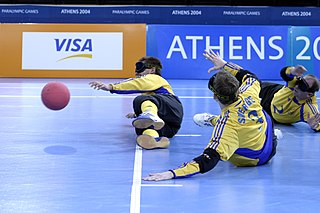
Goalball is a team sport designed specifically for athletes with a vision impairment. Participants compete in teams of three, and try to throw a ball that has bells embedded in it into the opponents' goal. The ball is thrown by hand and never kicked. Using ear-hand coordination, originating as a rehabilitation exercise, the sport has no able-bodied equivalent. Able-bodied athletes are also blindfolded when playing this sport.

Goalball is a team sport designed specifically for athletes with a vision impairment. Australia commenced its involvement in the sport in 1980. Its men's team has completed in trans-Tasman competitions, the IBSA World Goalball Championships, and the Paralympic Games.

Goalball is a team sport designed specifically for athletes with a vision impairment. Australia commenced its involvement in the sport in 1980. Its women's team has completed in trans-Tasman competitions, the IBSA World Goalball Championships, and the Paralympic Games.

Jodi Glenda Willis-Roberts, OAM is a visually impaired Australian Paralympic athlete and goalballer.

Meica Horsburg is an Australian goalball player. She began playing the sport in 2004, the same year she made her national team debut. After the national team took a three-year break, she was named the captain in 2010 and played in the Goalball World Championships. She was selected to represent Australia at the 2016 Summer Paralympics in goalball, where she captained the side.

Jennifer Blow is an Australian goalball player and is classified as a B3 competitor. Having only started playing the sport in 2009, she has several goalball scholarships. She plays for the New South Wales women's goalball team in the Australian national championships, where she has won three silver medals. As a member of the national team, she has competed in the 2010 World Championships, 2011 IBSA Goalball World Cup and the 2011 African-Oceania regional Paralympic qualifying competition. She represented Australia at the 2016 Summer Paralympics in goalball.

Tyan "Little Girl" Taylor is an Australian goalball winger and is classified as a B3 competitor. In 2009, after only a month playing the sport, Taylor was named to the New South Wales team. She made the national team in 2011 and has played in the 2010 World Championships, 2011 IBSA Goalball World Cup and 2011 IBSA Africa Oceania Goalball Regional Champions. She has been selected to represent Australia at the 2016 Summer Paralympics in goalball.

Nicole Esdaile is an Australian goalball player and is classified as a B2 competitor. She took up the sport in 1999, and made her national team debut in 2010. Subsequently, she has competed at the 2010 Goalball World Championships, 2011 IBSA Africa Oceania Goalball Regional Champions and 2011 IBSA Goalball World Cup. She was selected to represent Australia at the 2016 Summer Paralympics in goalball.

Rachel Henderson is an Australian goalball player and is classified as a B2 competitor. While only starting playing the game in 2010, she made the national team in 2011 and competed in the 2011 IBSA Goalball World Cup and 2011 African-Oceania regional Paralympic qualifying competition. She was selected to represent Australia at the 2012 Summer Paralympics in goalball.

Michelle Rzepecki is an Australian goalball player classified as a B3 competitor. She made her debut for the Australia women's national goalball team at the 2011 African-Oceania regional Paralympic qualifying competition. She was selected to represent Australia at the 2016 Summer Paralympics in goalball.
Goalball classification is the classification system for goalball. Goalball players with a disability are classified into different categories based on their vision based disability type. The classification is handled by the International Blind Sports Association.
The 2011–12 Australia women's national goalball team, known as the Belles, is a goalball team that played in two Paralympic qualifying competitions and the 2012 Summer Paralympics. The official announcement confirming the 2011–12 team was made in May 2012. The team included Jennifer Blow, Meica Christensen, Michelle Rzepecki, Nicole Esdaile, Rachel Henderson and Tyan Taylor. Most of the players, with the exception of Christensen, were relatively new. Their first competition was the International Blind Sports Federation (IBSA) World Goalball Games, with the top two teams qualifying for the Summer Paralympics. While Australia finished second in its pool, it ended the tournament in sixth place following a loss to Israel. Their second major competition was the ISBA Oceania-Africa Goalball Regional Championships, where they beat New Zealand in the semi-final, and again in the final, to qualify for the London 2012 Paralympic Games.
Canada men's national goalball team is the men's national team of Canada. It takes part in international goalball competitions. Goalball is a team sport designed specifically for athletes with a vision impairment. The team can consist of up to six athletes, and three team staff when on court, and may also have team managers.
Canada women's junior national goalball team is the women's junior national team of Canada. It takes part in international goalball competitions.

Australia competed at the 2016 Summer Paralympics in Rio de Janeiro, Brazil, from 7 to 18 September 2016. Australia repeated its 2012 Summer Paralympics achievement in finishing fifth of the medal tally.

Algeria competed at the 2016 Summer Paralympics in Rio de Janeiro, Brazil, from 7 to 18 September 2016.
Sevda Altınoluk is a Turkish female Paralympian goalball player competing for Yenimahalle Belediyespor in Ankara. She is a member of the national team.

Raissa Martin is an Australian goalball player who has been selected to represent Australia at the 2016 Rio Paralympics.

Sümeyye Özcan is a Turkish female middle distance runner and goalball player in the B1 class. She is a member of the national team.
The IBSA World Games or World Blind Games are an international multi-sport event, occurring every four years, organized by the International Blind Sports Federation (IBSA). The events enable blind and partially sighted athletes to compete in a number of sports. The first event took place at Madrid, Spain in 1998.













